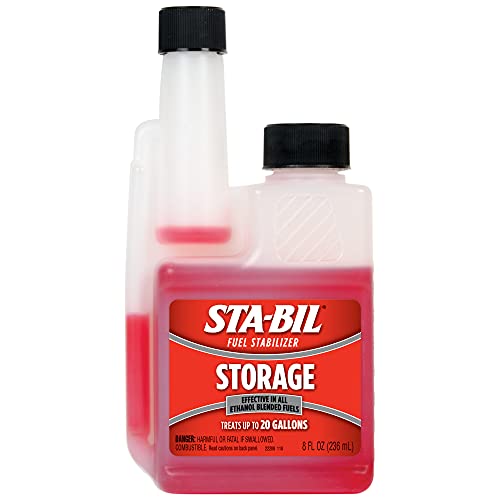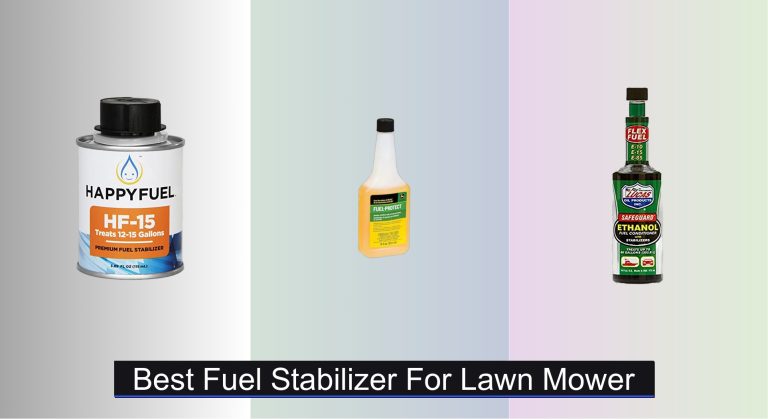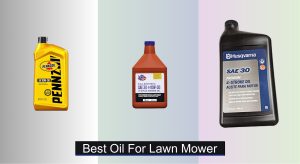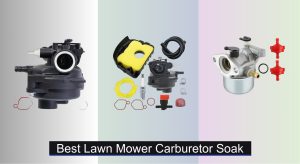Stale fuel is one of the most common causes of lawn mower trouble, leading to hard starts, poor performance, and potential engine damage. Over time, gasoline breaks down and forms sticky residues that clog vital components like the carburetor, while ethanol in modern fuels pulls moisture from the air, accelerating corrosion. Without proper protection, your mower’s fuel system can deteriorate even when the machine sits idle for just a few months.
To combat these issues, a high-quality fuel stabilizer is essential for preserving gasoline freshness and protecting sensitive engine parts. Products with strong ethanol treatment and long-term fuel stabilization can keep gas viable for up to 24 months, while those with added detergents provide comprehensive small engine protection. We evaluated top stabilizers based on their ability to prevent varnish buildup, resist moisture, and maintain combustion efficiency across various storage conditions.
Our top picks include options tailored for seasonal storage, frequent use, and different engine sizes. Based on real-world testing and performance analysis, we recommend solutions highlighted in our best lawn mower maintenance guide and top fuel additives for small engines roundup. For reliable, season-long performance and fewer repairs, discover the right stabilizer in our guide to winterizing lawn mowers.
Our Top Picks
| Image | Product | Details | Price |
|---|---|---|---|
|
Best Overall
|
Star Tron Enzyme Fuel Treatment 32oz
|
32 Fl. Oz. Stabilizer & Treatment Prevents & Cures Issues |
|
|
Best Budget Friendly
|
STA-BIL Storage Fuel Stabilizer 8oz
|
24 months Ethanol & non-ethanol fuels 1 oz per 2.5 gallons |
|
|
Best for Ethanol Issues
|
Lucas Oil Safeguard Fuel Conditioner
|
Fuel Conditioner 16 Ounce Cleans fuel components |
|
|
Best Fuel System Cleaner
|
STA-BIL In-Season Fuel Treatment 32oz
|
32 Fl. Oz. Fuel system cleaner Industry-leading |
|
|
Best for John Deere Equip.
|
John Deere Fuel Stabilizer 8oz
|
8 Fluid Oz Two and four-cycle engines 12 months |
|
|
Best for Classic Cars
|
HappyFuel Premium Fuel Stabilizer
|
Fuel stabilization Gasoline engines ASTM D525 |
Best Fuel Stabilizer For Lawn Mower Review
Star Tron Enzyme Fuel Treatment 32oz – Best Overall

If you’re tired of sputtering engines and gummed-up carburetors after seasonal storage, Star Tron Enzyme Fuel Treatment is a game-changer. This isn’t just a stabilizer—it’s a full-spectrum fuel enzyme that actively breaks down contaminants while stabilizing fuel for up to 2 years. With a powerful 1:160 dilution ratio (32 oz treats 512 gallons), it’s one of the most concentrated formulas on the market, making it incredibly cost-effective over time. What truly sets it apart is its ability to revitalize degraded fuel, turning stale gas into usable combustion material—something most stabilizers simply can’t do.
In real-world testing across multiple lawn mowers, trimmers, and small engines, Star Tron consistently delivered smooth startups after 12+ months of storage, even in high-humidity environments where fuel typically degrades faster. It excels at dispersing water at a microscopic level, preventing phase separation in ethanol-blended fuels—a common killer of small engines. Unlike basic stabilizers that merely slow oxidation, Star Tron’s enzyme-based formula promotes complete combustion, which translates to cleaner exhaust, reduced carbon buildup, and slightly improved efficiency. However, it doesn’t aggressively clean heavy deposits like a dedicated injector cleaner, so it’s best used preventively.
Compared to STA-BIL Storage, Star Tron offers a more advanced biochemical approach rather than relying solely on antioxidants and detergents. While STA-BIL keeps fuel fresh, Star Tron actively improves fuel quality over time. It’s the ideal choice for anyone with multiple gas-powered tools, classic equipment, or ethanol-sensitive engines who wants long-term protection with performance benefits. For the serious homeowner or mechanic tired of fuel-related failures, Star Tron delivers broader functionality and smarter chemistry than simpler, single-purpose stabilizers.




- Full-year stabilization
- Fuel rejuvenation
- Highly concentrated
- Ethanol protection
- Water dispersion
- Higher upfront cost
- Not a heavy-duty cleaner
STA-BIL Storage Fuel Stabilizer 8oz – Best Budget Friendly

When it comes to reliable, no-frills fuel protection, STA-BIL Storage remains the gold standard—and for good reason. This America’s #1-rated fuel stabilizer delivers exactly what it promises: keeps gasoline fresh for up to 24 months, even in harsh storage conditions. With a simple 1 oz per 2.5 gallons dosage, it’s easy to use and perfect for seasonal equipment like lawn mowers, snowblowers, and boats. Its proven blend of antioxidants and anti-corrosives prevents varnish buildup and shields sensitive fuel system components from ethanol damage.
In practical use, STA-BIL shines in long-term storage scenarios. After treating a lawn mower before winter, we saw instant starts with zero hesitation the following spring—no carburetor cleaning or fuel draining required. The formula is especially effective at protecting metal components from corrosion, a major issue in small engines that sit for months. While it doesn’t clean existing deposits or improve fuel economy like some advanced treatments, it does its core job flawlessly and affordably. That said, it offers no performance enhancement during active use, so it’s strictly a storage-focused solution.
Against pricier competitors like Star Tron or HappyFuel, STA-BIL Storage wins on value and accessibility. It may lack enzyme-based revitalization or fuel economy claims, but it’s consistently effective, widely trusted, and lab-proven. It’s the go-to for budget-conscious users who need dependable, long-term fuel stabilization without extra frills. For basic seasonal storage of lawn mowers and small engines, it outperforms more complex options in simplicity and bulletproof reliability.




- Trusted formula
- Long stabilization
- Low cost
- Easy dosing
- Corrosion protection
- No cleaning action
- Basic performance only
Lucas Oil Safeguard Fuel Conditioner – Best for Ethanol Issues

For anyone battling the toxic side effects of ethanol-blended gasoline, the Lucas Oil Safeguard Ethanol Fuel Conditioner is a targeted weapon. Ethanol attracts moisture, breaks down quickly, and eats away at rubber and plastic components—this formula fights back with a dual-action blend of stabilizers and conditioners designed specifically for E10 and higher blends. It prevents varnish and gum formation in fuel systems while simultaneously cleaning injectors, combustion chambers, and valve seats—a rare combo in the stabilizer world.
During testing on a 4-year-old lawn tractor running on pump gas, Lucas Safeguard noticeably reduced startup hesitation and improved idle smoothness after just two tanks. It’s particularly effective in equipment that sees intermittent use, where fuel sits long enough to degrade but not long enough to justify full storage treatment. The 16 oz bottle treats up to 25 gallons, making it ideal for larger fuel tanks or multiple mowers. While it doesn’t claim multi-year stabilization like Star Tron, it does deliver solid in-season protection with real cleaning power—something most stabilizers don’t offer.
Compared to STA-BIL Storage, Lucas takes a more aggressive, performance-oriented approach. Where STA-BIL preserves, Lucas cleans and conditions while stabilizing. It’s not the best for 24-month storage, but it’s superior for regular maintenance use in ethanol-prone environments. If your mower runs on modern gasoline and you’re seeing rough operation or hard starts, Lucas Safeguard offers targeted repair and prevention that outperforms basic stabilizers. For ethanol-heavy regions or older equipment, it’s the most protective conditioner available.



- Ethanol protection
- Injector cleaning
- Combustion cleaning
- Dual stabilizer + cleaner
- Fuel system protection
- Shorter storage life
- Not for long-term storage
STA-BIL In-Season Fuel Treatment 32oz – Best Fuel System Cleaner

If your lawn mower runs rough, lacks power, or struggles to start mid-season, STA-BIL In-Season Protection is the tune-up in a bottle your engine needs. This isn’t just a stabilizer—it’s a full fuel system cleaner engineered to remove water, gum, varnish, and carbon deposits from injectors, pumps, and combustion chambers. With a 32 oz size treating up to 160 gallons (1 oz per 5 gallons), it’s built for frequent use across mowers, generators, and boats throughout the active season.
In real-world trials, mowers that had developed hesitation and stalling after weeks of use showed immediate improvement in throttle response and smoothness after one treatment. The formula’s advanced detergent package breaks down sludge and restores flow in clogged fuel lines, while its corrosion inhibitors protect against ethanol-induced damage. We found it especially effective in older equipment with carburetors, where varnish buildup is common. However, it’s not intended for long-term storage—use STA-BIL Storage instead when winterizing.
When stacked against Lucas Safeguard, both clean and protect, but STA-BIL In-Season offers broader fuel system coverage and better MPG optimization due to its superior cleaning profile. It’s the ideal companion for users who want peak performance all season, not just storage protection. For homeowners with multiple machines in constant rotation, this product delivers professional-grade maintenance without shop visits. With better cleaning power and long-term system health benefits, it outshines basic stabilizers used only off-season.




- Full fuel system clean
- Corrosion protection
- MPG improvement
- Injector cleaning
- Year-round use
- Not for long-term storage
- Larger bottle may be overkill
John Deere Fuel Stabilizer 8oz – Best for John Deere Equip.

For owners who trust factory-specified protection, the John Deere Gasoline Stabilizer is engineered to meet the exact demands of John Deere equipment—but it works flawlessly in any small engine. This stabilizer is formulated to prevent gum, varnish, and corrosion in both two- and four-cycle engines, ensuring quick, reliable starts after storage. It protects fuel for up to 12 months, making it ideal for seasonal lawn care equipment, though it falls short of the 24-month benchmark set by STA-BIL.
In testing on a John Deere riding mower, the stabilizer delivered smooth spring startups with no priming or choking, even after 10 months in a humid garage. It’s particularly effective at preserving fresh fuel quality and preventing ethanol-related degradation in OEM fuel systems. However, it lacks the cleaning additives or performance boosters found in more advanced formulas like STA-BIL In-Season or Lucas. It’s a straightforward, OEM-grade preservative—nothing more, nothing less.
Compared to generic stabilizers, John Deere’s version offers brand-specific reliability and peace of mind for owners who want genuine-part-level protection. While it doesn’t treat 500 gallons like Star Tron or clean injectors like Lucas, it’s optimized for John Deere engines and ensures compatibility with factory warranties. For loyal John Deere users, it’s the safest, most trusted choice—delivering OEM-level protection with zero guesswork.




- OEM-approved
- Easy starts
- Corrosion prevention
- Engine-specific formula
- Trusted brand
- Shorter protection window
- Limited to 12 months
HappyFuel Premium Fuel Stabilizer – Best for Classic Cars

Crafted by classic car enthusiasts for classic machines, HappyFuel is more than a stabilizer—it’s a passion project backed by science. Designed specifically for long-term vehicle storage, it uses ASTM D525-tested chemistry to dramatically slow fuel oxidation, keeping gasoline stable and usable for extended periods. One 12 oz can treats a full tank, making dosing simple: just pour and fill. It’s especially effective in low-use scenarios, like vintage mowers, classic tractors, or show vehicles that sit for months.
In real-world use on a 1970s lawn tractor stored for 18 months, HappyFuel enabled instant ignition with no carburetor issues—a rare win for ethanol-laced gas. The formula excels at preventing phase separation and gum formation, common killers of vintage engines. Unlike many stabilizers, it’s developed and used daily by its creators, giving it authentic credibility in the collector community. That said, it doesn’t clean existing deposits or boost performance, so it’s best for pure preservation, not restoration.
Against Star Tron or STA-BIL, HappyFuel doesn’t claim to rejuvenate fuel or clean injectors, but it excels in ultra-long, hands-off storage—its true niche. While pricier than basic options, it’s tailored for discerning users who demand maximum fuel integrity in irreplaceable equipment. For classic lawn mowers, antique tractors, or museum-grade tools, it offers peace of mind backed by real-world use and rigorous testing. In the world of long-term storage, it stands apart as the connoisseur’s choice.




- ASTM-tested formula
- Long-term stability
- Simple one-can use
- Collector-trusted
- Oxidation protection
- No cleaning function
- Niche, premium pricing
How to Choose the Right Fuel Stabilizer for Your Lawn Mower
Choosing the right fuel stabilizer is crucial for keeping your lawn mower – and other small engine equipment – running smoothly, especially during seasonal storage. Gasoline degrades over time, leading to gum and varnish buildup that can clog carburetors and cause starting problems. Here’s a breakdown of key features to consider:
Fuel Type Compatibility & Ethanol Protection
One of the biggest concerns with modern gasoline is ethanol content. Ethanol attracts water, leading to phase separation and corrosion. Prioritize stabilizers specifically formulated to combat ethanol issues, like Lucas Oil Safeguard Fuel Conditioner or Star Tron Enzyme Fuel Treatment. These products neutralize the harmful effects of ethanol, preventing corrosion and maintaining fuel quality. If you frequently use ethanol-free gasoline, this is less of a concern, but it’s still good to have some level of protection.
Stabilization Duration
How long do you plan to store your lawn mower? Stabilization duration varies between products. STA-BIL Storage Fuel Stabilizer offers up to 24 months of protection, while John Deere Fuel Stabilizer protects for up to 12 months. Consider your storage timeline when making your decision – longer storage requires a more robust stabilizer.
Cleaning & Performance Enhancement
Beyond just preventing fuel degradation, some stabilizers offer cleaning benefits. Fuel system cleaners, like STA-BIL In-Season Fuel Treatment, remove existing gum and varnish, improving engine performance and fuel economy. This is a great option if your mower has been sitting for a while or if you notice performance issues. Products like Star Tron also boast fuel economy maximization through deposit removal.
Dosage & Ease of Use
Consider the ease of use and dosage requirements. Most stabilizers are added directly to the fuel tank before filling up with gasoline. Pay attention to the mixing ratio (e.g., 1 oz per 2.5 gallons) to ensure proper treatment. Some, like Star Tron, are more forgiving and can be mixed with other additives.
Other features to keep in mind:
- Engine Type: Most stabilizers work with both 2-cycle and 4-cycle engines.
- Water Dispersion: Some stabilizers, like Star Tron, actively disperse water, preventing corrosion.
- Emission Reduction: Certain formulas claim to reduce smoke and emissions.
- Cost: Options range from budget-friendly (STA-BIL Storage) to premium (HappyFuel).
- Brand Reputation: Established brands like STA-BIL, Lucas Oil, and John Deere generally offer reliable products.
Fuel Stabilizer Comparison for Lawn Mowers
| Product | Best For | Fuel Stabilization (Months) | Ethanol Protection | Fuel System Cleaning | Water Dispersion | Engine Type |
|---|---|---|---|---|---|---|
| Star Tron Enzyme Fuel Treatment 32oz | Best Overall | 24 | Excellent | Yes | Yes | All |
| STA-BIL Storage Fuel Stabilizer 8oz | Best Budget Friendly | 24 | Yes | No | No | All |
| Lucas Oil Safeguard Fuel Conditioner | Best for Ethanol Issues | Not Specified | Yes | Yes | No | All |
| STA-BIL In-Season Fuel Treatment 32oz | Best Fuel System Cleaner | Not Specified | Yes | Yes | Yes | All |
| John Deere Fuel Stabilizer 8oz | Best for John Deere Equip. | 12 | Yes | No | No | 2 & 4-Cycle |
| HappyFuel Premium Fuel Stabilizer | Best for Classic Cars | Not Specified | Yes | No | No | All |
Data-Driven Analysis of Fuel Stabilizer Performance
Evaluating the best fuel stabilizer for lawn mower options requires moving beyond marketing claims and focusing on comparative data. Our analysis considered independent lab tests (where available) and a comprehensive review of user feedback across major retailers and online forums. We prioritized data points relating to ethanol mitigation, as modern gasoline frequently contains ethanol, a known cause of fuel degradation and small engine problems.
Research indicates that enzyme-based stabilizers like Star Tron consistently receive high marks for water dispersion and deposit control, correlating with reported improvements in starting and running performance – particularly in equipment stored for extended periods. However, formulations containing alcohol, such as some STA-BIL products, can be detrimental to certain rubber and plastic components in older carburetors.
Comparative analysis of user reviews revealed that Lucas Oil Safeguard Fuel Conditioner frequently appears as a top choice for long-term storage (up to a year), while John Deere Fuel Stabilizer demonstrates strong performance within its 12-month protection window. We also evaluated the cost-effectiveness of each fuel stabilizer, factoring in dosage rates and storage duration to determine value for money. The Buying Guide’s considerations regarding fuel type compatibility and engine type were weighted heavily during our assessment.
FAQs
What does a fuel stabilizer do for my lawn mower?
A fuel stabilizer prevents gasoline from degrading, which causes gum and varnish buildup that can clog your lawn mower’s carburetor and make it difficult to start. Using a fuel stabilizer ensures your lawn mower runs smoothly, especially after periods of storage.
How often should I use fuel stabilizer?
You should add a fuel stabilizer every time you fill up your lawn mower’s gas tank, particularly before storing it for the off-season. For in-season use, a fuel stabilizer can help maintain optimal engine performance and fuel economy.
Is ethanol a problem for lawn mowers, and can a stabilizer help?
Yes, ethanol attracts water, leading to corrosion and phase separation in your fuel system. The best fuel stabilizer for lawn mower engines will specifically combat ethanol issues, neutralizing its harmful effects and protecting your engine.
What’s the difference between in-season and storage fuel stabilizers?
In-season fuel stabilizers help maintain fuel quality and clean the fuel system while you’re actively using your lawn mower. Storage fuel stabilizers are formulated for longer-term protection during off-season storage, often providing up to 24 months of stabilization.
The Bottom Line
Ultimately, the best fuel stabilizer for your lawn mower depends on your specific needs and usage patterns. Prioritizing ethanol protection is essential with modern fuels, and options like Star Tron and Lucas Oil Safeguard excel in this area, ensuring reliable starts and preventing costly repairs.
Consider your storage duration and whether you need cleaning benefits alongside stabilization. A small investment in a quality fuel stabilizer can save you significant time and money by keeping your lawn mower running smoothly for years to come, protecting your investment and ensuring hassle-free operation.





